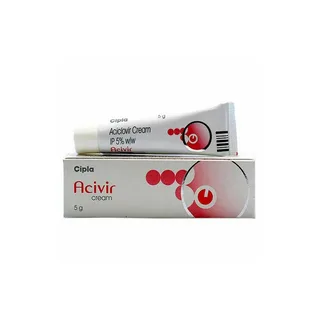Acivir cream, containing the antiviral agent acyclovir, is commonly used to treat cold sores caused by the herpes simplex virus (HSV). However, individuals may wonder whether Acivir cream can be safely applied to open sores or wounds. In this article, we'll explore the suitability of Acivir cream for open sores or wounds, its mechanism of action, potential risks, and considerations for its use in wound care.
Understanding Acivir Cream
Before delving into its application on open sores or wounds, let's briefly understand Acivir cream. Acivir cream contains acyclovir, a synthetic nucleoside analogue that inhibits the replication of HSV by blocking viral DNA synthesis. It is primarily indicated for the treatment of cold sores (herpes labialis) caused by HSV-1.
Mechanism of Action
Acyclovir, the active ingredient in Acivir cream, works by selectively inhibiting viral DNA polymerase, an enzyme essential for the replication of HSV. By interfering with viral DNA synthesis, acyclovir prevents the virus from multiplying and spreading, thereby reducing the severity and duration of cold sore outbreaks.
Can Acivir Cream Be Applied to Open Sores or Wounds?
1. Suitability for Open Sores
While Acivir cream is specifically formulated for the treatment of cold sores, it is generally not recommended for use on open wounds or sores. Applying Acivir cream to open wounds may cause stinging, burning, or irritation, as the active ingredients can penetrate the damaged skin barrier and reach underlying tissues.
2. Potential Risks
Applying Acivir cream to open wounds or sores may pose several risks, including:
- Increased Irritation: The active ingredients in Acivir cream may exacerbate inflammation and irritation in open wounds, leading to discomfort and delayed healing.
- Risk of Infection: Open wounds are susceptible to bacterial contamination and infection. Applying Acivir cream to open wounds may not only fail to address the underlying infection but also increase the risk of secondary infections.
- Delayed Healing: Acyclovir, while effective against HSV, is not designed to promote wound healing. Using Acivir cream on open wounds may interfere with the natural healing process and prolong the recovery time.
Considerations for Wound Care
1. Cleanliness and Hygiene
For open wounds or sores, it's essential to prioritize cleanliness and hygiene to prevent infection and promote healing. Clean the wound gently with mild soap and water, pat dry with a clean cloth, and apply an appropriate wound care product recommended by a healthcare professional.
2. Consultation with a Healthcare Provider
If you have open sores or wounds that require treatment, it's crucial to consult with a healthcare provider for personalized advice. They can assess the severity of the wound, recommend appropriate wound care strategies, and prescribe medications if necessary.
3. Alternative Treatment Options
For the treatment of open sores or wounds, healthcare providers may recommend alternative topical medications or wound dressings specifically designed to promote healing and prevent infection. These products may contain ingredients such as antibiotics, antiseptics, or wound-healing agents.
Conclusion
In conclusion, while Acivir cream is an effective treatment for cold sores caused by HSV-1, it is not recommended for use on open sores or wounds. Applying Acivir cream to open wounds may increase the risk of irritation, infection, and delayed healing. If you have open sores or wounds that require treatment, consult with a healthcare provider for appropriate wound care strategies and medication options tailored to your individual needs.

